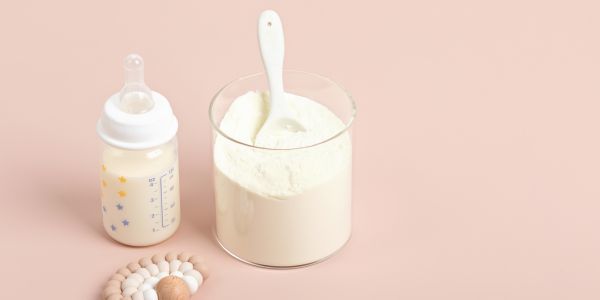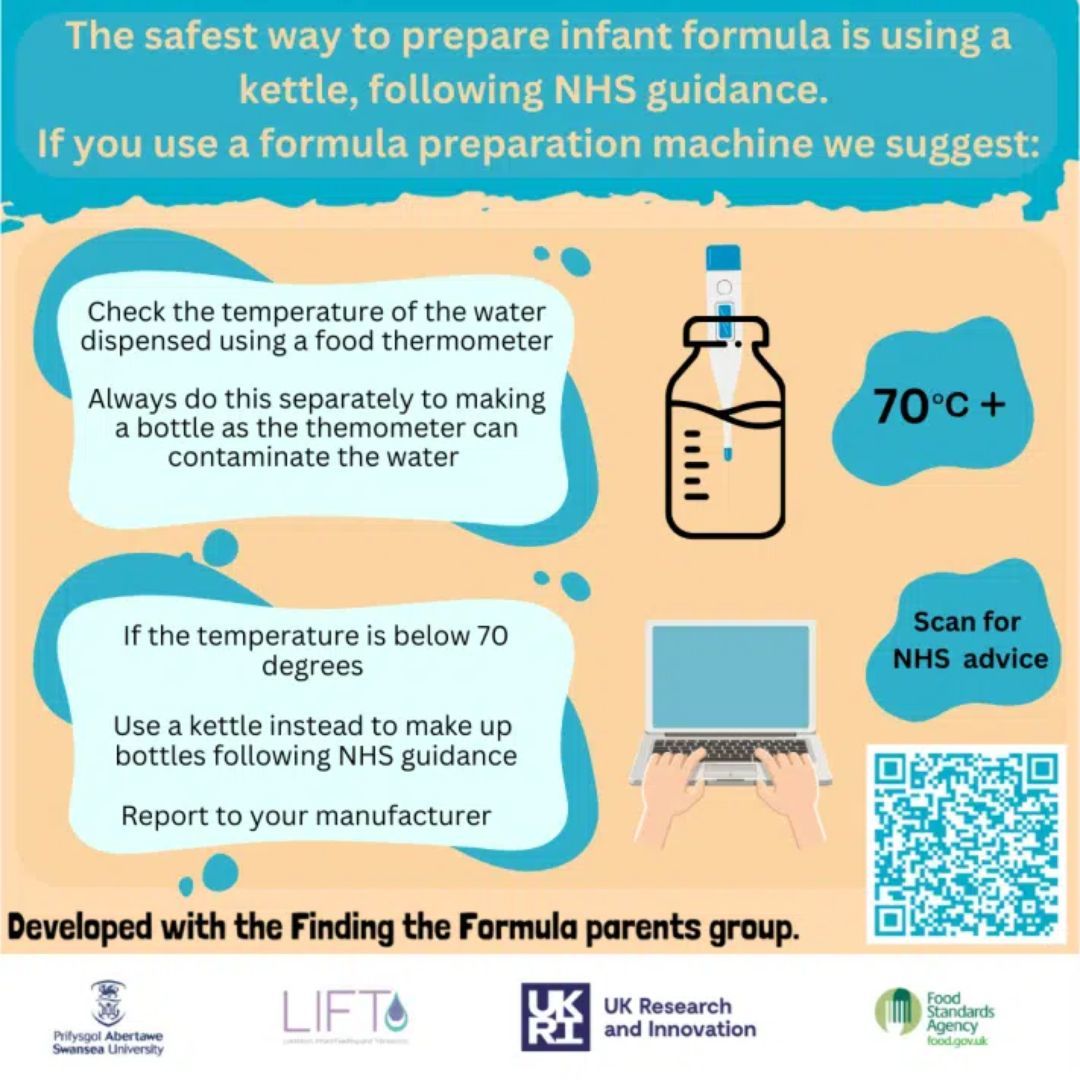

Research published by the University of Swansea has raised fresh concerns about the safety of formula preparation machines.
After a recent discussion on our page with our followers, we spotted this new research and felt it worthy of sharing. Formula preparation machines, which are very popular amongst formula feeding parents, are actually not advised by NHS professionals, with formula feeding guidance advising against them.
This is a tricky topic to address, as whilst it's important safety information, we don't want parents to feel unduly judged or shamed - that isn't the intention.
For those of you who are unfamiliar with formula preparation machines; these machines are designed to emulate the same processes as the same formula preparation methods, with a spout of ot water to sterilise the formula powder, and then some cooler water that is processed through a specialised filter to produce a bottle at the perfect tempetature, but concerns have repeatedly been raised due to parents reporting gastrointestinal issues in their babies after using the machine, incidents of mould build-up, and reports that the hot water jet in certain machines simply does not always reach a high enough temperature.
Formula powder is, believe it or not, not actually sterile and it can harbour some extremely dangerous bacteria strains, which is why using water that is hot enough is so vital.
The findings of the study...
The research published by Swansea University this week found that, despite being marketed as reaching the right temperature, ‘at home formula preparation devices’ often do not actually produce water hot enough - at least 70 degrees celcius - to kill bacteria that may be lurking within infant formula. Cronobacter sakazakii is an example of one of the very nasty bateria that may be found in unsterile formula and it can cause serious illness in infants.
It's medically acknowledged that formula-fed babies experience gastrointestinal infections at higher rates than breastfed infants, partly down to bacteria in powdered formula, and partly due to 'bacterial contamination of infant feeding equipment', which is why the NHS has adopted the World Health Organisation recommendation that water used for preparing formula is hotter than 70 degrees Celcius. This is why it's so important that the safety of formula preparation machines is properly addressed - we want our babies to be safe and healthy, no matter how they are fed!
For this research, 200 UK-based parents of infants younger than 12 months were recruited.
Key findings:
- Only 14.9% of 74 formula preparation machines produced a water temperature of higher than 70 degrees Celcius, compared with 78.3% of 69 kettle users.
- On average, formula preparation machine temperatures were 9 degrees Celcius lower than when parents used a kettle to prepare a bottle.
- Most parents do routinely wash and sterilise bottles and teats, as per the guidance.
- However, many parents did not always fully follow NHS safe formula preparation guidance - 21.8% only wash their hands half prior the time or less, and 14.6% regularly pre-prepare bottles.
- The study found that most parents did not appear to understand the risks of formula bacteria contamination.
Study recommendations:
The study advised that parents should be advised that many formula preparation machines will not produce water that meets the minimum temperature needed to kill any bacteria in formula powder, which isn't sterile as we mentioned earlier. Instead, they should be advised to follow the NHS formula preparation advice of using the kettle to produce water that is at least 70 degrees celcius, and ideally up to 85 degress celcius.
The study also expressed concerns, stating that there is an 'urgent need for stronger consumer protections with respect to the marketing of formula and formula preparation devices to further protect infants from formula-related bacterial contamination, which can result in serious ill health and even death.' This would ensure that formula labelling meets the WHO guidance.
It has suggested by the study that parents who continue to use formula preparation machines should use a thermometer to ensure that the hot water is the correct temperature, and that all of the powder makes contact with the hot water spout.
Finally, infographics produced by Swansea University and First Steps Nutrition Trust, and in partnership with the Food Standards Agency have been shared to further spread the message to parents and professonals.

What is the NHS safe formula preparation guidance?
The NHS advises that the safest way to prepare a bottle is with a kettle, one feed at a time - you can read the NHS guidelines on this here.
We appreciate that a lot of people may have raised babies before this guidance, and have parents, aunties and uncles who used formula preparation methods that are no longer advised - and they're alive and kicking, so it can't be that unsafe, surely? This is a bias created by lack of awareness; if we don't hear about the very real cases where babies have become seriously unwell, we only have the positive experience engrained, which is understandable. It's simply a case of scientists realising that something isn't the best practice, and updating the guidance given to parents to keep our babies happy, healthy and thriving - whilst most people will be 'fine', there is always a chance of illness, and that's something that we should strive to minimise the chances of.
It's also totally understandable why so many parents opt for a formula preparation machine; in theory, they're a total godsend, because if you have a baby who seems to go from zero to roaring with furious hunger unpredictably (because not all babies feed on schedule, this is normal), we want to feed them! This where infant feeding cues become important - learning more about them could be incredibly helpful.
How can I learn my baby's early hunger cues?
Learning your baby's early hunger cues could be a total game-changer; it's something that doesn't seem to be taught to new parents as much these days and could make a massive difference, giving you time to prepare your baby's bottle safely with the kettle and cool down in a jug of cold water before your baby starts to cry with hunger. The NCT advises that crying is usually a late sign of hunger, and to watch out for baby;
- sticking their tongue out
- putting their hands to their mouth
- starting to get restless
- opening their mouth and turning their head to the side
- sucking on their fists or fingers.
These signs could give you an advance warning to put the kettle on and get a jug of cold water ready, making it much easier to not rely upon formula preparation machines if you choose to discontinue using yours.
You can read more about formula hunger cues here.
Our verdict...
We're totally supportive of all mums and feeding methods but definitely think that this study, alongside the NHS guidelines on safe formula prep, should definitely be highlighted more to new parents. The information on early hunger cues in babies is really useful and we wonder why it isn't promoted more during midwife appointments - not everyone is able to get to NCT and other similar sessions during their pregnancy, so it's no wonder that so many new parents don't spot the early signs until their baby is screaming to be fed meaning that formula preparation machines suddenly seem so enticing.
Fundamentally, we want our babies to have a full tummy, to not be crying and distressed because they're needing a feed, but also to be healthy and if these machines are raising the risks of babies becoming poorly, then it absolutely needs to be addressed by the manufacturers, and the NHS should do more about this other than simply advising against them.
Other articles...


.png)







.jpg)